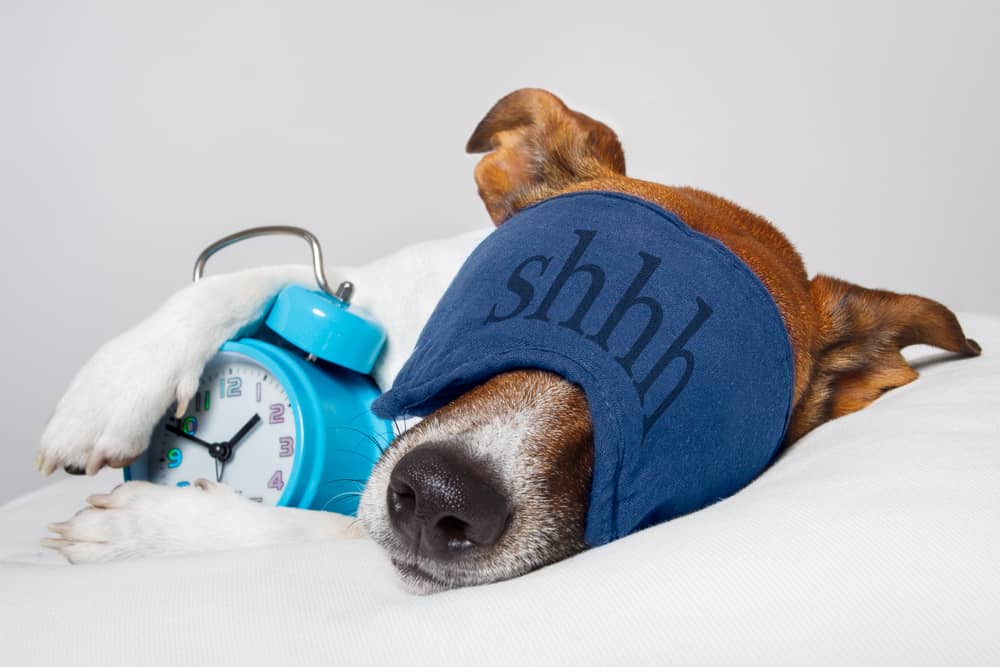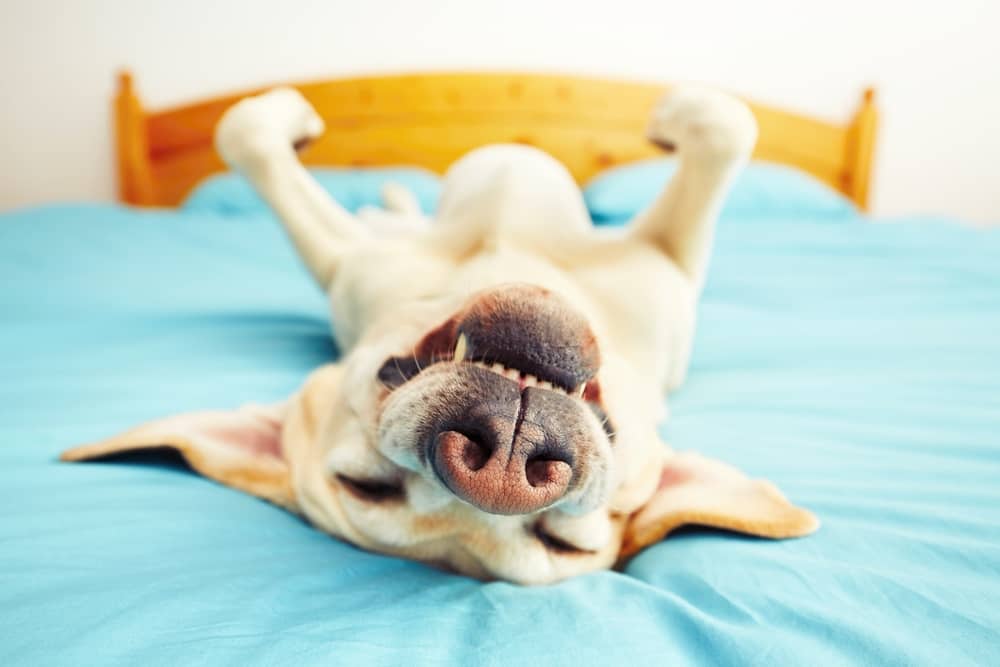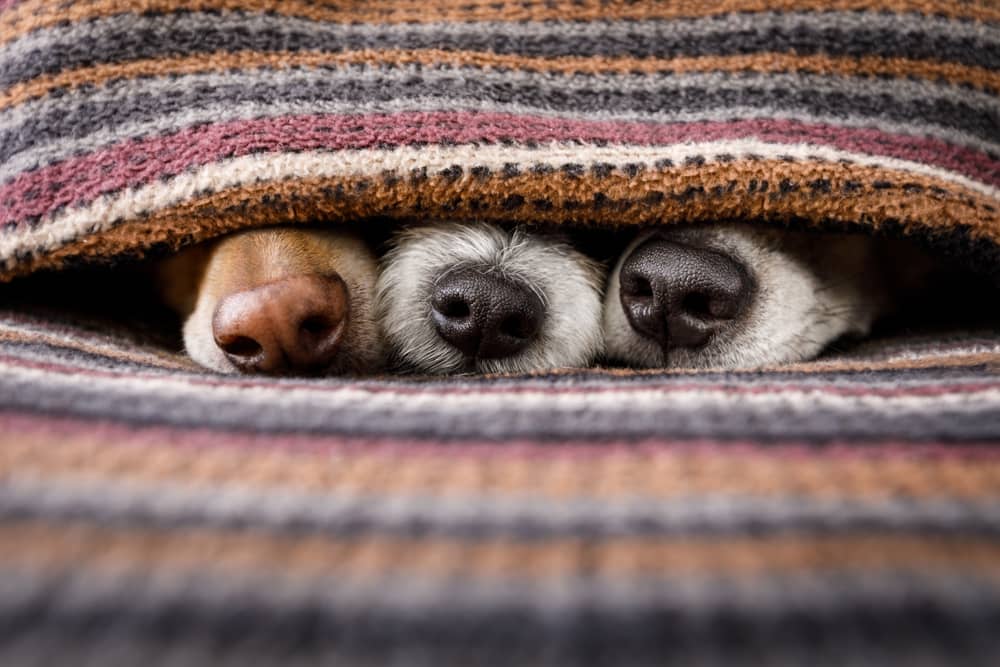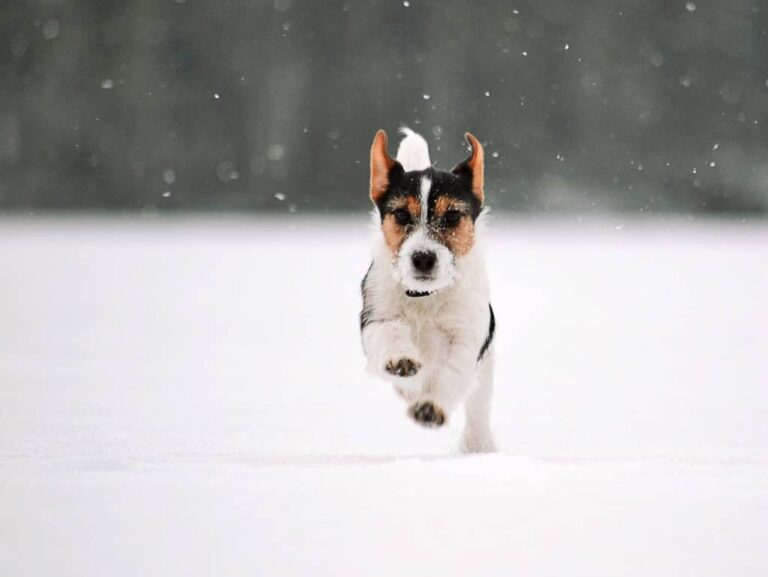Can Dogs Sleepwalk? – Ultimate Guide
This is also one of the big questions, can dogs sleepwalk? One common and extensively researched sleep problem in people is sleepwalking, commonly known as somnambulism.
It is defined by complicated behaviors such as walking while unconscious or acting out other complex actions. You can read more about the AKC website.
What about dogs, though? Can Dogs Sleepwalk? The answer to this issue, which has long baffled both pet owners and experts on animal behavior, is not as simple as “yes” or “no.”

This article will cover the facts surrounding canine parasomnias and the evidence supporting canine sleepwalking. We will also examine additional sleep issues that can impact dogs and discuss how to identify and treat them.
Also Read: Blue Nose Gotti Pitbull: Dog Breed Information and Owner’s Guide
By the end of this article, you will better understand the complex relationship between dogs and sleep and how to promote healthy sleep behaviors in your furry friend.
Can dogs sleepwalk?
Yes, just like us, dogs can sleepwalk. Canine parasomnias include somnambulism, sometimes referred to as sleepwalking.
Sleep walking dogs can look disoriented, pace, or walk aimlessly, and they can act differently when awake, such as jumping or barking.
It’s crucial to have your dog tested by a veterinarian if you think it could be sleepwalking so it can be diagnosed with parasomnia or another condition.
Facts surrounding canine parasomnias:
Facts on canine parasomnias, such as sleepwalking dogs, are as follows:
- The term “parasomnia” refers to various sleep disorders, including sleepwalking dogs, night terrors, and eating problems associated with sleep.
- Scientific research has discovered canine parasomnias, one of the behaviors seen in dogs is sleepwalking.
- Sleep walking dog can look confused, pace or walk aimlessly, and they may behave differently when awake, such as jumping or barking.
- It is thought that particular breeds of dogs, such as Doberman Pinschers and Labrador Retrievers, are more likely to experience sleep walking dog.
- Numerous factors, like heredity, stress, drugs, and medical problems, might contribute to parasomnias.
- It is critical to identify parasomnias from other disorders, such as seizures and cognitive dysfunction, that might lead to similar behaviours.

Things that Could Be Misunderstood as Sleepwalking Dogs
The majority of sleepwalking-like actions in dogs are probably caused by medical issues, sleep disorders, and other diseases because dogs don’t appear to genuinely sleepwalk. Some of the most probable causes are as follows:
Also Read: Can German Shepherds Eat Watermelon? Ultimate Guide
● Neurological diseases
The brain and nerve system of your dog could not operate as they should, which can cause several odd behaviours.
Even when a dog is fully awake, certain neurological conditions like seizures might cause him to appear to be sleepwalking.
Additionally, they have the power to cause him to behave strangely, such as pace in circles, lean his head against a wall, or vocalize without cause.
If your dog displays these kinds of unusual actions, you should have him evaluated right away because several neurological diseases can be harmful to his health (and some can be fatal if left untreated).
This does not imply that you must call your veterinarian each time your dog exhibits unusual behaviour; if I did, I’d never end the call.
But it is wise to ask your vet for advice if a pattern of odd behaviors starts to emerge or if they start happening frequently.
● Issues With Sleepwalking Dogs
Although research on animal sleep disorders is still in its early stages, it appears that dogs can have some of the same kinds of sleep disorders as people.
This includes conditions like sleep apnea, in which breathing stops for brief intervals of time, and bedwetting.
Dogs can also experience narcolepsy and sleeplessness. Extreme daytime sleepiness and atypical sleep phase patterns can both be brought on by these diseases.
As a result, your dog may appear to be sleeping while awake, which can cause you to believe that he is sleep walking dog.
If you think your dog has this kind of issue, you should have him tested by a veterinarian (ideally one who specializes in sleep disorders).
Some of these conditions can be harmful; for instance, you shouldn’t allow your narcoleptic dog to run loose by the pool unsupervised.
Additionally, some conditions, such as canine sleep apnea, can cause abrupt death.
● Cognitive Disabilities
Unfortunately, as dog’s age, some will lose cognitive ability. They can get confused, act strangely, or roam around aimlessly as a result of this.
Owners occasionally mistake these actions for sleep walking dog, especially if they happen at night.
There isn’t much that can be done to prevent or slow down this form of mental deterioration, and it seems to be a natural part of ageing for certain dogs.
Instead, you’ll just need to accept your dog’s new situation and do everything you can to keep him from getting hurt or getting lost.
You should still take your dog to the vet to make sure that his or her elderly age is the cause of the weird actions and not some other medical condition because you don’t want to neglect a problem that could be resolved.
Also Read: English Cream Goldendoodles – Ultimate Guide

Sleepwalking signs in dogs
Pet owners frequently mention that their dogs wander around the house at night, unaffected by the lights being turned on or by visitors entering the space.
The dog can be gently led back to its bed, where it will return to normal the next morning.
You might wonder if this is what is known as canine sleepwalking. This type of behavior, according to experts, has nothing to do with sleepwalking.
In contrast to people, dogs do not move while they are sleepwalking. They are more prone to make erratic movements, such as paddling their feet like they’re running.
It’s common to equate trance-like movements in dogs with ageing. It could be the outcome of a mental or cognitive illness.
So, if you see your dog acting similarly, do not assume it is a sign of sleepwalking. It can be a sign of another sleep disorder, such as dementia, narcolepsy, or cataplexy.
To determine the underlying reason for their dog’s sleep issue, dog owners must carefully watch their pets.
Can dogs have nightmares?
Yes, nightmares can happen to pets. Similar to humans, dogs can go through many sleep stages, including REM (rapid eye movement) sleep, which is when most dreams take place.
Dogs can wiggle their paws, make noises, or exhibit other dream-related behaviors while they are in REM sleep.
These dreams might occasionally be pleasant, but they can also be terrifying. Whining, sobbing, or pacing while they are asleep are indications that your dog might be having a nightmare.
Sleep Walking Dog Treatment
It has been shown that high-quality food significantly helps treat canine sleep issues. Feed a nutrient-dense diet rich in vitamins, tocopherols, omega-3 fatty acids, antioxidants, and other beneficial nutrients.
Consult your veterinarian about the various possibilities, and whenever feasible, try to feed organically.
Make sure your home is a secure place for your dog to wander if he has a disorder that cannot be healed, only controlled.
You could wish to keep him separated in an area free of danger or a puppy playpen that limits his movement.
It could be dangerous if a dog is in deep REM sleep and is awakened because the dog might bite or lose control.
He could come off as if he’s in the throes of a nightmare, but he’s probably only chasing a squirrel. Avoid waking him up suddenly and let your dog get comfortable on his own.
To determine the underlying cause of this unusual behaviour, you should speak with your veterinarian, as it could be a sign of a serious ailment. You might even arrange for a neurological evaluation for your dog.
Also Read: What you need to know about Anatolian Shepherd Lab Mix?
Do dogs sleepwalk and pee?
Dogs can sleepwalk and urinate at the same time. Dogs who suffer from a sleep disorder called parasomnia, sometimes known as sleepwalking, may exhibit odd sleeping activities like pacing, walking, or other sophisticated actions while they are unconscious.
If a dog is sleepwalking and urinating, it may be because they are unable to regulate their bladder during the period and are not conscious of what they are doing.

Can dogs sleep bark?
Dogs can sleep and bark. Sleep barking, often referred to as nocturnal barking, is a form of parasomnia that can happen while you’re sleeping.
Sleep barking in dogs can happen during many sleep stages, including REM sleep, just like sleepwalking or sleep talking in humans.
Dogs may go through this period where they have vivid dreams and act or vocalize, including barking.
While it’s widely accepted that sleep barking is typical behavior and not a reason for alarm, it can disturb the dog’s owner or other housemates who are trying to sleep.
How do I get my dog to stay asleep all night long?
Finding the source of the sleep issue is the first step, if it is possible. There is frequently an effective remedy available if we are struggling with pain or another medical ailment.
DRUGS-FREE OPTIONS for Sleep Walking Dog
There are simple things you can try, like:
● An orthopaedic mattress
This ought to be simple to get into and out of and provide elderly joints with the support they require.
● A routine for the night
this could include a late bathroom visit, a massage, and some quiet time before bed.
● A few calming tones
Some pets may benefit from soft music played for them, to keep them calm and relaxed.
● A lamp at night for sleepwalking dogs
this could be useful for ageing dogs with bad night vision.
● Your Dog needs your Company
You can try keeping your pet close at night if you find that some dogs simply sleep better with their humans.
Alternatively, you might try pheromone therapy, which helps some dogs feel better. If your dog is constantly worried, it’s available as a collar or as a plug-in diffuser you put near the dog’s bed.

Also Read: The Ultimate Guide for German rottweiler puppy
SUPPLEMENTS AND NUTRACEUTICALS
Numerous supplements, including vitamin E, gingko bilboa, and selenium, are said to slow down the ageing of the brain. There isn’t a lot of really good evidence to support their effectiveness yet.
You might think about trying S-adenosyl-1-methionine (SAMe) if you want to try something new.
Although it is most frequently used for liver disease, this may also be advantageous for osteoarthritis and dementia.
Although there are ‘pet’ versions of this, it is rather generally accessible because people use it too.
There are no known warnings, and it is safe and well-tolerated. 18 mg/kg is administered once a day on an empty stomach.
The dosages are listed below, rounded to the nearest size of the “pet” tablet:
- Under 5.5 kg dogs should take one 90 mg tablet daily.
- Dogs 5.6 to 11 kg: two 90 mg pills daily, or one 225 mg tablet if it’s more convenient.
- Dogs weighing 11.1 to 16 kg: one 225 mg tablet daily
- 16.1 to 29.5 kg dogs should take two 225 mg tablets daily.
- Dogs 29.6 to 41 kg: three 225 mg pills daily
- Canines weighing more than 41.1 kg: four 225 mg pills daily.
Melatonin may be mentioned as a treatment for sleep issues. While it is true that as we (people and dogs) age, our natural melatonin levels tend to decline, there isn’t a lot of data to suggest that supplements are all that helpful.
While some human products can be used in dogs without harm, it is strongly advised not to give human painkillers to animals without first consulting a veterinarian.
Conclusion
Dogs are complicated animals that can engage in a variety of sleeping behaviours, such as moving around or switching sleeping positions, sleepwalking, and sleep barking.
Numerous things, like worry, discomfort, or the dog’s particular personality and habits, can contribute to these actions.
Even though the majority of these actions are regarded as typical and unproblematic, it’s essential to closely monitor your dog’s behavior and get veterinarian guidance if you have any worries.
Providing a safe and cozy sleeping space for your dog can also encourage good sleeping habits and reduce the possibility of disruptive or troublesome sleeping habits.

Also Read: Red Golden Retriever Puppies – Ultimate Guide
FAQ’S
Why does my dog walk around at night?
Your dog might be walking at night for a variety of reasons. There could be anxiety, discomfort, or restlessness behind it.
Additionally, they can be looking for a cozy place to sleep or requesting comfort or attention from their owner.
Why does my dog move from spot to spot while sleeping?
To find a comfortable posture or to respond to changes in their resting environment, such as variations in temperature or noise, dogs may shift from place to place when dozing.
Additionally, they can be having a dream or nightmare, which can make them move or speak.
Why does my dog sleep against me?
Dogs may like to sleep next to their owners for a variety of reasons, such as warmth, protection, or comfort.
Another possibility is that they have grown particularly close to their owner and genuinely enjoy their company.
Dogs can feel more secure and at ease while sleeping if they are curled up next to their owner.





